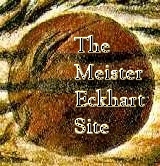|
|
||
 |
Meister Eckhart Home / Works by Meister Eckhart - Quotes / Inspired by Eckhart / Studies / The Papal Condemnation / Mail & Announcements / Links / Books |
ERNST TROELTSCH
From:
Ernst Troeltsch, The social teaching of the Christian
Churches, v. II,
tr. Olive Wyon, 1931, pp. 730 - 741. Here published without footnotes.
Page 3
MYSTICISM IN THE NEW TESTAMENT
Thus, in all religious systems in these varied forms mysticism is a universal phenomenon. It reached a particularly high stage of development in India, Persia, Greece, Asia Minor, and Syria. It was only natural that it should appear within the primitive Christian movement, where it developed partly from within, out of its own life, and in part was introduced from without and eagerly accepted. It is to this mysticism that the so-called "Enthusiasm" of the Primitive Christian Church, a large part of the "spiritual gifts", the "speaking with tongues", the power of exorcism, the whole of its spiritual activity, belongs; this phenomenon recurs again and again, in the Christian sect-movement, down to the present day, bringing home with great power the redemptive energy of the Gospel to the individual soul. Paul, in particular, on his mystical side represents this type of Christianity which existed along with his Church convictions in a permanent state of tension, though he himself was not aware of a conflict between the two tendencies. Paul took over the Christ-cult of the Primitive Church as a form of religion which had already been objectified in worship, tradition, and organization. But he inspired it with a deep and passionate mysticism, which also utilized the ancient terminology of the pagan mysteries. It is in this alone that his religious originality consists, contrasted with the view of the Primitive Church; and it was only thus that his anti-Jewish universalism became practically effective. Thus the Lord's Supper, the centre of the new cult, became to him a mystical, substantial union, and Baptism became an actual dying and rising again with Christ. To him Christ became an actual sphere of life of a supersensual kind, in which the believer lives, feels, and thinks, and becomes a new spiritual personality, "a new creature". Thus all that was merely ceremonial and traditional was relegated to the sphere of "the flesh" and "the world", and the "Christ according to the flesh" fades out of sight. So the history of Israel was allegorized and spiritualized, in order that it could be directly applied to the Christian believer, and the Christian community became the spiritual Body of Christ. Ecstasies and visions were not wanting, spiritual gifts were exalted and cultivated, and incorporated into a new spiritual life.